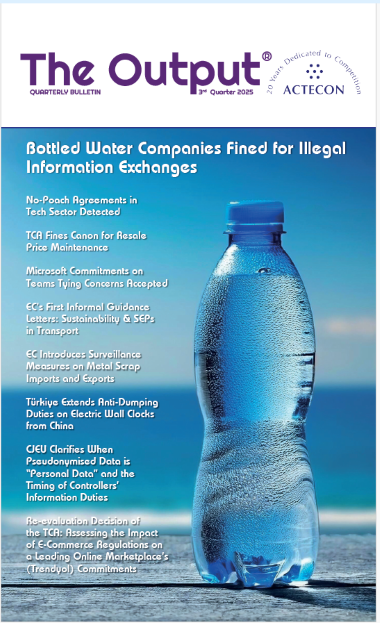No Exemption for Johnson&Johnson In Any Way
| Competition Law

No Exemption for Johnson&Johnson In Any Way
Article by Esen Ergül and Mert Kudat
The Turkish Competition Board (“TCB“) has recently issued a no-go decision for the envisaged selective distribution system of Johnson&Johnson Sıh. Mal. San. ve Tic. Ltd. Şti. (“Johnson”)[1]. The decision concerns Johnson’s application before the Turkish Competition Authority (“TCA”) for an individual exemption to be granted to the “Human Pharmaceutical Warehouse Sales Agreement“ (“Agreement”) planned to be concluded with 9 (nine) pharmaceutical warehouses.
The Agreement was related to the distribution of certain human medicine owned by Johnson (namely, Darzalex, Imbruvica, Stelara and Zytiga) by only 9 (nine) pharmaceutical warehouses, and used for the treatment of serious illnesses, particularly, Darzalex and Imbruvica are used for the treatment of orphan diseases. To that end, it was envisaged to establish a quantitative selective distribution system by amending Johnson’s current distribution system. With this introduction, the number of pharmaceutical warehouses currently distributing these products will decrease from 40 (forty) to nine (9).
Furthermore, this new proposed system will restrict the selected warehouses’ sales to other warehouses that are excluded from the selective distribution system.
In its application, Johnson stated that the relevant medicines subject to the Agreement were chosen taking into account that these medicines are subject to parallel export, their prices per unit are high and they are of special nature due to their usage for the treatment of serious illnesses. Additionally, Johnson indicated that although the Agreement directly limits the number of warehouses, the relevant nine warehouses were selected according to some objective criteria such as financial power, number of provinces and pharmacies served, efficient distribution and logistics network, and past experiences in the warehousing sector. It was also specified that selection of different kinds of pharmaceutical warehouses, including the small-scaled ones and cooperatives, was ensured and that the system was formed in a way that pharmacies in each city have access to at least two pharmaceutical warehouses.
Additionally, Johnson asserted that products subject to the Agreement require high expertise, high technologies, and special conditions in terms of their storage and transportation. It was also indicated that the significant price difference between the relevant products and other pharmaceuticals prove the necessity of implementation of this system. Moreover, based on Johnson’s application, the TCB identified that the main purpose of the envisaged system is to prevent the sales of the relevant products through parallel exports and with the introduction of this system, it is aimed to keep track of the medicines sold abroad by engaging with a limited number of pharmaceutical warehouses.
In determination of the relevant product market, the TCB followed former practices of the European Union Commission and itself, referring to the European Pharmaceutical Marketing Association's ATC categorization. In this regard, the TCB, by considering an analysis on a narrower product market was deemed to be unnecessary given that the envisaged distribution system only covers sales to independent pharmacy channel, defined the relevant product markets on the basis of ATC-3 categorization.
Within this scope, the TCB, first, analysed whether the Agreement benefits from the Block Exemption Communiqué on Vertical Agreements No. 2002/2 (“Communiqué No. 2002/2“) and after determining that the market shares of the relevant products are below 40% and thus, could benefit from the block exemption, assessed whether the Agreement include any hard-core restriction that would result in the Agreement being excluded from the scope of the Communiqué No. 2002/2. At this point, the TCB found that (i) the envisaged selective distribution system is not necessary for human medicine sector, (ii) the relevant sector consists of various products similar to the products subject to the Agreement in terms of their characteristics and (iii) therefore, the criteria, on which the selection of the distributors to be included within the relevant system is based, cannot be acquitted with the characteristics of those 4 (four) products. In this respect, the TCB concluded that Johnson’s restriction on the warehouses’ sales would not benefit from the protective cloak of the Communiqué No. 2002/2.
Furthermore, it was determined that the restriction on these warehouses preventing them from selling/exchanging the products to/with other warehouses also cover passive sales, which also prevents the Agreement from benefiting from the block exemption.
Afterwards, the TCA proceeded with individual exemption analysis and assessed the Agreement by taking into consideration four cumulative conditions stipulated under Article 5 of the Law No. 4054 on the Protection of Competition (“Competition Law”), which are as follows:
- The agreement must contribute to the improvement of the production or distribution of goods or the promotion of technical or economic progress;
- it must allow consumers a fair share of the resulting benefit;
- it should not afford the parties the possibility of eliminating competition with respect to a substantial part of the products in question; and
- it should not impose on the undertakings concerned restrictions which are not indispensable to the attainment of the first two objectives.
In evaluation of the first condition, the TCB stated that despite the envisaged system would allow Johnson to monitor the distribution and reduction in costs, the implementation of this practice through a selective distribution system would result in restriction of passive sales of other warehouses intending to supply these products to their customers. Furthermore, the criteria determined by Johnson for selection of the relevant pharmaceutical warehouses could be met by many warehouses and therefore, the TCB identified that the Agreement was not drafted based on these criteria but rather by limiting the number of warehouses at the distribution level. Finally, the TCB considered that these criteria were not actually decisive on Johnson’s selection and accordingly, held that the relevant practice could not be qualified as a selective distribution system.
On the other hand, it was indicated that prevention of exports of the relevant products would contribute to access to these products in Turkey and prevent possible delays in treatments. From this point of view, it was evaluated that an improvement in terms of the first condition could be deemed present. Nevertheless, it was concluded that the first condition of individual exemption was not fulfilled as (i) the envisaged sales restrictions on distributors would only come to mean an intervention in their sales and cannot be justified with an increase in efficiency and benefit served by it since the system is not considered as a selective distribution system, and (ii) the Agreement already includes another provision imposing an abroad sales ban in line with the Agreement’s purpose.
As to the second condition, positive effect on access to the relevant products in Turkey was reiterated. At this point, the TCB considered that although the Agreement could eliminate the potential concerns that could arise from supplying these products to independent pharmacies and conveying them to patients, given the restrictions on selected warehouses, pharmacies could face difficulties in procuring these products, which could complicate or delay consumers’ access to these products. Therefore, the TCB concluded that the second condition was not met.
For the third condition, the TCA, by reviewing the share of the products subject to the Agreement within Johnson’s sales, and the ratio of the products subject to the Agreement to the total sales in the independent pharmacy channel, concluded that the fact that some pharmaceutical warehouses cannot keep these products in their product portfolio would have very limited effect on competition in the relevant market and hence, the third condition was met.
With regard to fourth condition, the TCA concluded that even in case the first two conditions were met, the Agreement was still more restrictive than necessary for the envisaged improvements by finding that (i) the envisaged system is a closed system compared to a selective distribution system and cannot be considered as a selective distribution system, (ii) thus, the restriction on sales cannot result in an increase in efficiency and advantages, (iii) rather, it would result in intervention on the distributors’ resales, (iv) this restriction is not necessary for ensuring the availability of these products in Turkey and (v) the Agreement already includes another provision to reach the aim of restricting abroad sales.
In consequence, the TCA held that (i) the proposed Agreement between Johnson and nine pharmaceutical warehouses falls within the scope of Article 4 of the Competition Law as including hard-core restrictions, (ii) the Agreement does not benefit from the block exemption provided under the Communiqué No. 2002/2 and (iii) the Agreement could not be granted individual exemption since it does not meet all conditions stipulated under Article 5 of the Competition Law.
[1] TCB’s decision dated 03.09.2020 and numbered 20-40/553-249, available at https://www.rekabet.gov.tr/Karar?kararId=42368006-634f-4cdb-9ca9-187fec4e6ca9 (Last Access on February 24, 2020).






